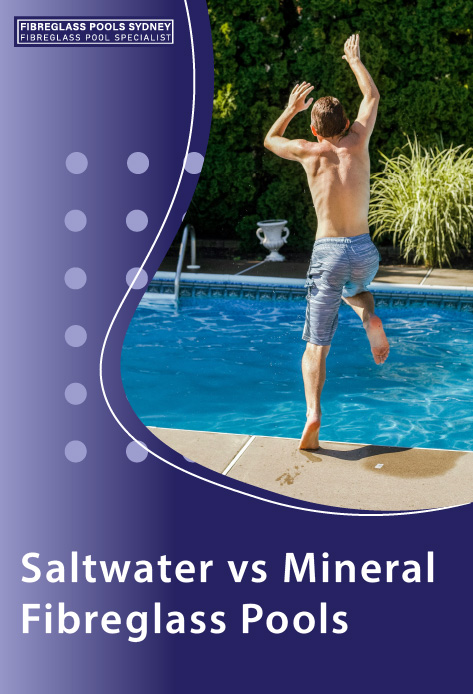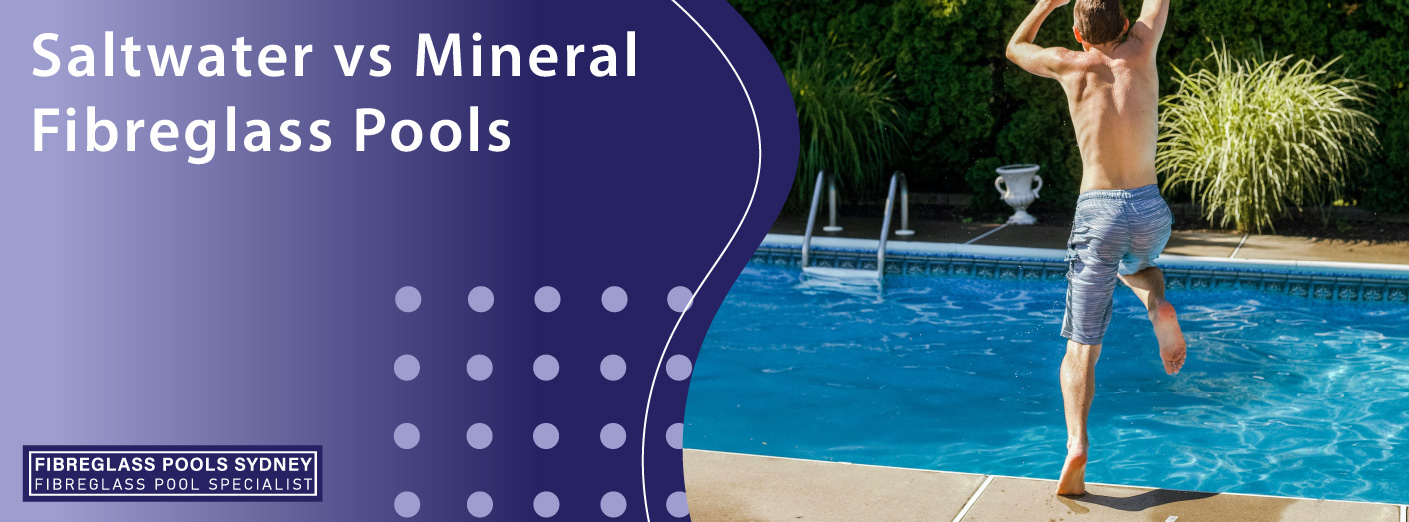Saltwater vs Mineral Fibreglass Pools
Pools have become the ultimate backyard luxury, and fibreglass pools are no exception. Growing in popularity for their durability and aesthetic appeal, they offer a hassle-free alternative to traditional concrete pools. But for pool enthusiasts, the choice doesn't end there. Deciding between a saltwater or mineral fibreglass pool can be crucial for long-term satisfaction. This blog post aims to guide you through this decision, helping you understand the pros and cons of each type so you can make an informed choice.

Saltwater Pools: An Overview
Saltwater pools provide a unique swimming experience, almost as if you’re taking a dip in the ocean. Unlike traditional chlorine pools, saltwater pools rely on a salt-chlorine generator to produce chlorine naturally. This results in softer water that is gentler on the skin and eyes.
Benefits of Saltwater Pools
One of the most significant benefits of saltwater pools is their lower chlorine levels, which means fewer chemicals for you and your family. This also translates to less maintenance, as you won’t need to add chlorine manually. Additionally, saltwater pools tend to have fewer algae problems, making the water clearer and more inviting.
Maintenance Considerations
While they require less chlorine, saltwater pools still need some upkeep. The salt-chlorine generator needs regular cleaning to function correctly, and salt levels must be monitored to ensure they stay within the recommended range. Also, salt can be corrosive, so you need to ensure your pool equipment and surrounding areas are resistant to salt damage.
Things to Consider
Saltwater pools may have higher initial costs due to the salt-chlorine generator, but the reduced need for chemicals can offset this over time. However, it’s essential to consider the long-term impact on your pool equipment and surrounding surfaces, as salt can be corrosive if not properly managed.
Mineral Fibreglass Pools: An Overview
Mineral fibreglass pools offer another alternative for those looking to reduce their chemical usage. These pools utilise natural minerals like magnesium to keep the water clean and clear, providing a luxurious swimming experience.
Advantages of Mineral Fibreglass Pools
Mineral fibreglass pools are renowned for their therapeutic benefits. Minerals like magnesium can soften your skin, reduce stress, and even help with muscle aches and pains. Furthermore, mineral pools require fewer chemicals, resulting in water that is gentler on the skin and eyes.
Care Requirements
Maintaining a mineral pool is relatively straightforward. You’ll need to monitor mineral levels and occasionally add minerals to the water. The pool’s filtration system will also require regular maintenance to ensure it continues to operate efficiently.
Cost Comparisons
Initial costs for mineral pools can be higher than for traditional chlorine pools, but like saltwater pools, the reduced need for chemicals can result in long-term savings. However, the cost of minerals can add up over time, so it’s essential to factor this into your budget.

Factors to Consider When Choosing a Pool
Choosing between a saltwater and mineral fibreglass pool involves more than just personal preference. Consider your local climate and environmental factors, as these can impact the type of pool that will work best for your needs.
Climate and Environmental Factors
If you live in a hot, dry climate, a saltwater pool might be more challenging to maintain due to higher evaporation rates, which can affect salt levels. On the other hand, mineral pools can be more forgiving in various climates, making them a versatile option.
Personal Preferences
Your health and lifestyle preferences also play a role in your decision. If you have sensitive skin or allergies, a mineral pool might be the better option due to its gentle, therapeutic water. Conversely, if you prefer a more natural swimming experience, a saltwater pool could be the way to go.
Health Considerations
Both types of pools offer benefits for your skin and overall well-being. However, if you have specific health concerns, it’s worth consulting a medical professional to determine which type of pool might be best for you.
Maintenance and Long-Term Costs
Maintenance and long-term costs are crucial factors to consider when choosing between a saltwater and mineral fibreglass pool.
Saltwater Pool Maintenance
Saltwater pools require regular monitoring of salt levels and occasional cleaning of the salt-chlorine generator. While the reduced need for chemicals can lead to long-term savings, the initial costs can be higher.
Mineral Pool Maintenance
Mineral pools also require regular monitoring and maintenance, particularly to ensure the correct mineral levels. The cost of minerals can add up over time, but the health benefits and luxurious swimming experience can make it worth the investment.

Comparing Costs Over Time
Both types of pools can offer long-term savings on chemicals, but it’s essential to consider the ongoing costs of maintenance and potential repairs. Investing in high-quality, durable pool equipment can help mitigate these expenses.
Environmental Impact
The environmental impact of your pool is another crucial consideration.
Saltwater Pools and the Environment
Saltwater pools can be more environmentally friendly due to their reduced chemical usage. However, the potential for salt corrosion to pool equipment and surrounding areas can offset these benefits.
Mineral Pools and Sustainability
Mineral pools also reduce the need for harsh chemicals, making them a more sustainable option. Additionally, the minerals used in these pools are often sourced responsibly, further enhancing their environmental credentials.
Water and Energy Usage
Both types of pools can be designed to be energy-efficient, with options for solar heating and energy-saving filtration systems. By choosing eco-friendly options, you can minimise the environmental impact of your pool.
Conclusion
Choosing between a saltwater and mineral fibreglass pool ultimately comes down to your personal preferences, health considerations, and environmental concerns. Both types of pools offer unique benefits, from the natural feel of saltwater to the therapeutic properties of mineral pools.
For those prioritising a more natural swimming experience with reduced chemical usage, a saltwater pool might be the best fit. On the other hand, if you seek a luxurious, spa-like experience with added health benefits, a mineral pool could be the way to go.
Whichever you choose, investing in a high-quality fibreglass pool ensures you enjoy years of hassle-free swimming. Ready to take the plunge? Start exploring pool options today and find the perfect match for your backyard oasis.
Saltwater vs Mineral Fibreglass Pools
Pools have become the ultimate backyard luxury, and fibreglass pools are no exception. Growing in popularity for their durability and aesthetic appeal, they offer a hassle-free alternative to traditional concrete pools. But for pool enthusiasts, the choice doesn't end there. Deciding between a saltwater or mineral fibreglass pool can be crucial for long-term satisfaction. This blog post aims to guide you through this decision, helping you understand the pros and cons of each type so you can make an informed choice.

Saltwater Pools: An Overview
Saltwater pools provide a unique swimming experience, almost as if you’re taking a dip in the ocean. Unlike traditional chlorine pools, saltwater pools rely on a salt-chlorine generator to produce chlorine naturally. This results in softer water that is gentler on the skin and eyes.
Benefits of Saltwater Pools
One of the most significant benefits of saltwater pools is their lower chlorine levels, which means fewer chemicals for you and your family. This also translates to less maintenance, as you won’t need to add chlorine manually. Additionally, saltwater pools tend to have fewer algae problems, making the water clearer and more inviting.
Maintenance Considerations
While they require less chlorine, saltwater pools still need some upkeep. The salt-chlorine generator needs regular cleaning to function correctly, and salt levels must be monitored to ensure they stay within the recommended range. Also, salt can be corrosive, so you need to ensure your pool equipment and surrounding areas are resistant to salt damage.
Things to Consider
Saltwater pools may have higher initial costs due to the salt-chlorine generator, but the reduced need for chemicals can offset this over time. However, it’s essential to consider the long-term impact on your pool equipment and surrounding surfaces, as salt can be corrosive if not properly managed.
Mineral Fibreglass Pools: An Overview
Mineral fibreglass pools offer another alternative for those looking to reduce their chemical usage. These pools utilise natural minerals like magnesium to keep the water clean and clear, providing a luxurious swimming experience.
Advantages of Mineral Fibreglass Pools
Mineral fibreglass pools are renowned for their therapeutic benefits. Minerals like magnesium can soften your skin, reduce stress, and even help with muscle aches and pains. Furthermore, mineral pools require fewer chemicals, resulting in water that is gentler on the skin and eyes.
Care Requirements
Maintaining a mineral pool is relatively straightforward. You’ll need to monitor mineral levels and occasionally add minerals to the water. The pool’s filtration system will also require regular maintenance to ensure it continues to operate efficiently.
Cost Comparisons
Initial costs for mineral pools can be higher than for traditional chlorine pools, but like saltwater pools, the reduced need for chemicals can result in long-term savings. However, the cost of minerals can add up over time, so it’s essential to factor this into your budget.

Factors to Consider When Choosing a Pool
Choosing between a saltwater and mineral fibreglass pool involves more than just personal preference. Consider your local climate and environmental factors, as these can impact the type of pool that will work best for your needs.
Climate and Environmental Factors
If you live in a hot, dry climate, a saltwater pool might be more challenging to maintain due to higher evaporation rates, which can affect salt levels. On the other hand, mineral pools can be more forgiving in various climates, making them a versatile option.
Personal Preferences
Your health and lifestyle preferences also play a role in your decision. If you have sensitive skin or allergies, a mineral pool might be the better option due to its gentle, therapeutic water. Conversely, if you prefer a more natural swimming experience, a saltwater pool could be the way to go.
Health Considerations
Both types of pools offer benefits for your skin and overall well-being. However, if you have specific health concerns, it’s worth consulting a medical professional to determine which type of pool might be best for you.
Maintenance and Long-Term Costs
Maintenance and long-term costs are crucial factors to consider when choosing between a saltwater and mineral fibreglass pool.
Saltwater Pool Maintenance
Saltwater pools require regular monitoring of salt levels and occasional cleaning of the salt-chlorine generator. While the reduced need for chemicals can lead to long-term savings, the initial costs can be higher.
Mineral Pool Maintenance
Mineral pools also require regular monitoring and maintenance, particularly to ensure the correct mineral levels. The cost of minerals can add up over time, but the health benefits and luxurious swimming experience can make it worth the investment.

Comparing Costs Over Time
Both types of pools can offer long-term savings on chemicals, but it’s essential to consider the ongoing costs of maintenance and potential repairs. Investing in high-quality, durable pool equipment can help mitigate these expenses.
Environmental Impact
The environmental impact of your pool is another crucial consideration.
Saltwater Pools and the Environment
Saltwater pools can be more environmentally friendly due to their reduced chemical usage. However, the potential for salt corrosion to pool equipment and surrounding areas can offset these benefits.
Mineral Pools and Sustainability
Mineral pools also reduce the need for harsh chemicals, making them a more sustainable option. Additionally, the minerals used in these pools are often sourced responsibly, further enhancing their environmental credentials.
Water and Energy Usage
Both types of pools can be designed to be energy-efficient, with options for solar heating and energy-saving filtration systems. By choosing eco-friendly options, you can minimise the environmental impact of your pool.
Conclusion
Choosing between a saltwater and mineral fibreglass pool ultimately comes down to your personal preferences, health considerations, and environmental concerns. Both types of pools offer unique benefits, from the natural feel of saltwater to the therapeutic properties of mineral pools.
For those prioritising a more natural swimming experience with reduced chemical usage, a saltwater pool might be the best fit. On the other hand, if you seek a luxurious, spa-like experience with added health benefits, a mineral pool could be the way to go.
Whichever you choose, investing in a high-quality fibreglass pool ensures you enjoy years of hassle-free swimming. Ready to take the plunge? Start exploring pool options today and find the perfect match for your backyard oasis.


